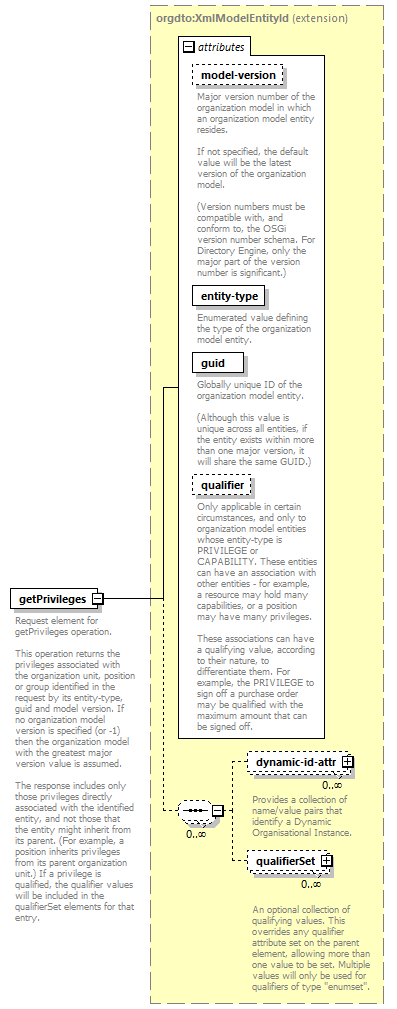| diagram |
 |
| namespace |
http://browse.api.de.n2.tibco.com |
| type |
extension of XmlModelEntityId |
| properties |
|
| children |
dynamic-id-attr qualifierSet |
| attributes |
| Name | Type | Use | Default | Fixed | Annotation | | model-version | xs:int | optional | -1 | | | documentation | Major version number of the organization model in which an organization model entity resides.
If not specified, the default value will be the latest version of the organization model.
(Version numbers must be compatible with, and conform to, the OSGi version number schema. For Directory Engine, only the major part of the version number is significant.) |
| | entity-type | OrganisationalEntityType | required | | | | documentation | | Enumerated value defining the type of the organization model entity. |
| | guid | xs:string | required | | | | documentation | Globally unique ID of the organization model entity.
(Although this value is unique across all entities, if the entity exists within more than one major version, it will share the same GUID.) |
| | qualifier | xs:string | optional | | | | documentation | Only applicable in certain circumstances, and only to organization model entities whose entity-type is PRIVILEGE or CAPABILITY. These entities can have an association with other entities - for example, a resource may hold many capabilities, or a position may have many privileges.
These associations can have a qualifying value, according to their nature, to differentiate them. For example, the PRIVILEGE to sign off a purchase order may be qualified with the maximum amount that can be signed off. |
|
|
| annotation |
| documentation | Request element for getPrivileges operation.
This operation returns the privileges associated with the organization unit, position or group identified in the request by its entity-type, guid and model version. If no organization model version is specified (or -1) then the organization model with the greatest major version value is assumed.
The response includes only those privileges directly associated with the identified entity, and not those that the entity might inherit from its parent. (For example, a position inherits privileges from its parent organization unit.) If a privilege is qualified, the qualifier values will be included in the qualifierSet elements for that entry. |
|
| source |
<xs:element name="getPrivileges">
<xs:annotation>
<xs:documentation>Request element for getPrivileges operation.
This operation returns the privileges associated with the organization unit, position or group identified in the request by its entity-type, guid and model version. If no organization model version is specified (or -1) then the organization model with the greatest major version value is assumed.
The response includes only those privileges directly associated with the identified entity, and not those that the entity might inherit from its parent. (For example, a position inherits privileges from its parent organization unit.) If a privilege is qualified, the qualifier values will be included in the qualifierSet elements for that entry.</xs:documentation>
</xs:annotation>
<xs:complexType>
<xs:complexContent>
<xs:extension base="orgdto:XmlModelEntityId"/>
</xs:complexContent>
</xs:complexType>
</xs:element> |
